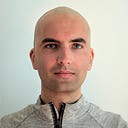Why I am studying journalism
I received a PhD in mathematics and then worked as a postdoctoral researcher at three universities for five years. Now, I am taking a one-year break from mathematics; I enrolled in a graduate program in journalism at Concordia University in July.
Mathematics is an art; it’s about creating beautiful structures. A mathematician makes an elegant proof just as an architect makes an elegant building or a musician composes a piece. The major difference is that ordinary people thrill by looking at the architecture or listening to the piece, but very few people can even understand the mathematical theorem you have proven. Sometimes, it is annoying that you cannot explain your work to others. One motivation for studying journalism is to create content that my Mom can understand and enjoy. Mathematics is abstract and I sometimes miss having human connection; Journalism is all about understanding other people and telling their stories.
Another motivation is having an impact. I have no idea if any of my mathematical work has any real impact on the outside world; I mostly do it because I enjoy doing it, just like an artist drawing a painting. However, it’s deeply satisfying to have a real impact. Also, I view it as a duty to contribute to the wellness of the world in some genuine way; journalism helps me achieve that. Some articles I have published in local media were read over a thousand times, and I’ve received feedback from people I’ve never met. It feels wonderful to connect with people via creating content.
The impact issue became particularly relevant to me when I became a Canadian citizen last summer. I suddenly felt that I’m part of this society, which means I expect more from myself than just having a good job and personal happiness — that would be too individualistic. I felt I need to do my share in making Canada a better country, but then I realized I know so little about this diverse society and its issues. Since my immigration 11 years ago, my social life has been confined to two bubbles, the Iranian immigrants’ community and the mathematics community. I felt the urge to burst these bubbles and get to know other people; journalism helps with that because it forces me to interact with diverse people. The group of my twenty-something classmates — some of whom you see here — itself is quite an amazing group of people with diverse ethnic and educational backgrounds and interests.
Some say journalism differs greatly from mathematics. Indeed, I’ve highlighted some differences above, but there are also many similarities between the two. In both, you need to do a great deal of background research, and accuracy and getting the details correctly are super important (and this is where they differ from arts). In both, strong, clear writing is crucial, and your goal is to produce something tangible and beautiful (and that’s where they differ from politics and activism). In both, you are educating others (point of difference from engineering and medicine). I love educating, doing background research, and writing; I’m also an accurate, detail-oriented person, which gives me confidence that I can be a good journalist.
After completing the journalism program in April 2021, my goal is to split my time between mathematics and journalism. I enjoy both; mathematics pays better while journalism is more impactful.
I’m an adventurous person who likes to experience new things and learn new skills (especially communication skills, i.e., being able to communicate my message compellingly, which will help me in all aspects of life). Even inside mathematics, in the past 12 years I travelled from graph theory to probability to algorithms to machine learning. I hate being a one-dimensional person who can do just one thing very well. I don’t like society to put the label “mathematician” on me and expect me to follow a predefined “progress” path. Unfortunately, it’s in the interest of a capitalist system to train such specialized people who are very good at doing a certain task but haven’t put the time and effort to grow other parts of their brains and don’t care about what’s going on in the world.
I encourage everyone to get out of their comfort zone and not follow what society expects from them, but decide, on their own, what’s best for their personal growth and follow that path. Certainly, one needs to be careful about practical matters such as money — I was lucky to have enough savings and prospects for a new job after graduation to be able to diverge from the standard path.
Nelson Mandela once said, “There is no passion to be found in settling for a life that is less than the one you are capable of living.”
